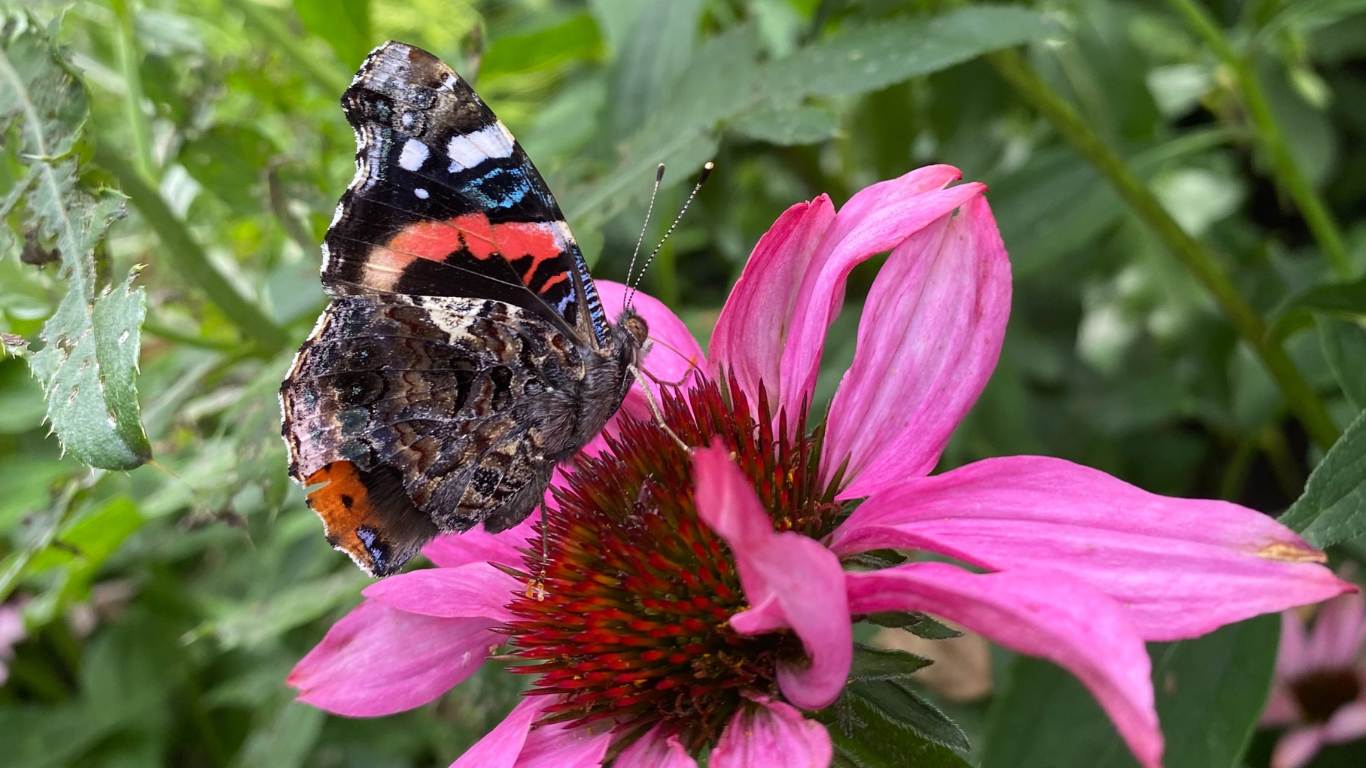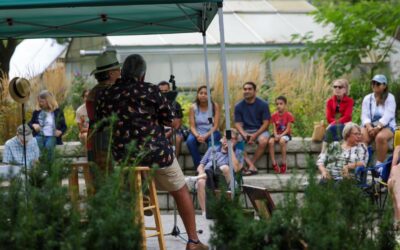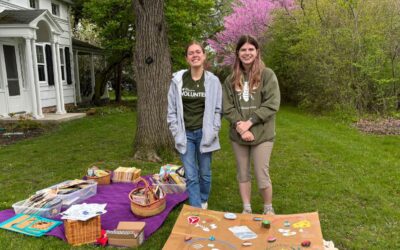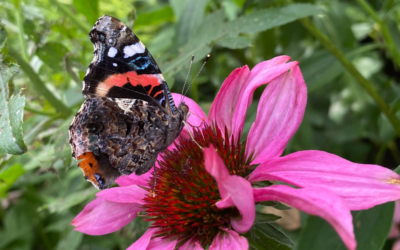From the Desk of Avery Bohman, 577 Program Coordinator
Imagine a honeybee buzzing on a striking yellow sunflower, a butterfly joyfully fluttering around in a field of asters, coneflowers, and goldenrods, or a hummingbird drinking nectar from a bright red flowering plant.
Pollination, an essential part of plant reproduction, is something that occurs all around us, but we don’t always consciously think about it or even stop to notice it. However, this process is one of the most important natural ecological functions.
Pollinators are extremely important to ecosystems because they fertilize flowers through the transfer of pollen from one flower to the next, which aids in healthy reproduction and growth of ecosystems. Agricultural systems and landscapes would not flourish without the help of pollinators like birds, bees, bats, butterflies, and beetles. Each year, pollinators produce around $20 billion worth of products, and it’s estimated that one-third of foods and beverages are delivered by pollinators. Pollinators also don’t just provide us with delicious foods and beautiful flowers, they also contribute to healthier ecosystems that protect and clean the air and soil, as well as support other wildlife.



These “busy bees” and other pollinator species work tirelessly to fertilize plants and support ecosystems. Unfortunately, pollinator populations are decreasing due to habitat loss and a severe lack of feeding. Climate change has contributed immensely with altering temperatures, increasing pollution rates, and even natural disasters. The use of harmful chemicals and diseases also damages the progression of pollinator habits.
We can do our part to help our pollinators by practicing responsible and sustainable habits, such as planting native plant species in a landscape and educating others about the importance of protecting of these pollinators. The awareness and education we build and spread will foster a positive impact on pollinator populations around the world.
Thanks to the organization Pollinator Partnership, we can take one full week of the year to commemorate and appreciate the work of these pollinator friends. Celebrated annually in the month of June—this year from June 17 to the 23—National Pollinator Week honors and celebrates pollinators and how they benefit our gardens and promote healthy ecosystems. This past week aimed to spread awareness about how these mighty creatures help our planet, the issues they’re facing around the world, and what we can do to help.
When initiating National Pollinator Week by Pollinator Partnership, their mission was to address these issues surrounding the declining populations of pollinators by spreading the word and getting our communities excited and passionate about saving our pollinating birds, bees, butterflies, and more. So, what can we do as individuals and as a community to help pollinators beyond this special week?
WAYS TO GET INVOLVED
Here are a few things you can do to join the movement and give pollinators some love:
- Plant native species. Native species attract more pollinators! This is one of the best ways to take direct action and give pollinators more green space. Planting more plant and flower species allows for more nesting room and boosts the supply of nectar and pollen. Check out local organizations that help with identifying native plants in Northwest Ohio like ODNR’s Native Plant List or Wild Ones Oak Openings Region Chapter of NW Ohio & SE Michigan, or even check out this national planting guide at https://www.pollinator.org/guides.
- Reduce your negative impact by staying away from harmful pesticides and synthetic fertilizers.
- Support local bees and beekeepers. Purchasing local honey supports your area’s beekeepers and minimizes global carbon emissions. Local honey has also been studied as a way to lessen allergy symptoms. PS: The Welcome Center & Curiosity Shop at 577 has local honey available for purchase from our volunteer beekeeper, Dan Bollett from Waterville Bee Works. PPS: Visit 577’s new bee hive and rescued swarm near Virginia’s House.
- Take classes. Interested in learning more about honeybees? Join 577 Volunteer Beekeeper in her Honeybees 101 class. The next session will be in early fall. Stay tuned for class date releases and more information.
- Spread the word. Share information with friends and family to educate them on the benefits of pollinators and their status. You could even host parties or events like a native planting day or cook-off. Don’t forget about social media! Share photos and facts online to boost Pollinator Week recognition.
- Donate. Donating helps researchers and scientists collect data, as well as helps Pollinator Partnership host events and special projects.
577 is proud to join the effort in protecting our pollinator species and helping to provide necessary solutions in combating climate change.



The Bee Room at 577 provides engaging information on bees, birds, rocks, and trees, and an indoor honeybee hive with live bees. This hive gives folks the opportunity for observation and education on the life of the honey bee. The thousands of bees gathering nectar from 577 Gardens produce honey and also perform the vital function of pollination, helping the gardens to produce flowers & vegetables. Click HERE to watch a short video to learn more about our bees.
Learn more about 577’s bee hives in our recent blog post: https://577foundation.org/2024/06/05/nurturing-our-beeyard-behind-the-buzz-of-577s-hives/.
Learn more about Pollinator Partnership, National Pollinator Week, and how to get involved at https://www.pollinator.org/pollinator-week.
577 and the Bee Room are open daily from 9am to 5pm, with no admission fee.



